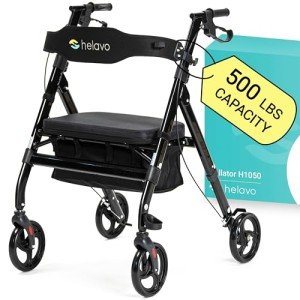What's The Current Job Market For Elderly Walker Professionals?
페이지 정보
작성자 Damien 작성일 25-09-10 02:44 조회 3 댓글 0본문
The Importance of Elderly Walkers: Enhancing Mobility and Independence
As people age, their bodies go through different changes that may affect their mobility. Conditions such as arthritis, osteoporosis, and other chronic conditions can make browsing the environment challenging for the Elderly Walker. Luckily, assistive devices like walkers can substantially enhance mobility, ensuring that seniors maintain their independence and quality of life. This article will look into the different types of walkers available, their advantages, and essential factors to consider when picking the best one.
Comprehending the Different Types of Walkers
A walker can provide the essential support for seniors having a hard time with mobility. Nevertheless, not all walkers are developed equivalent. Here's a thorough breakdown of the various types of walkers readily available.

| Type of Walker | Description | Best For |
|---|---|---|
| Standard Walker | A lightweight frame with four legs offering basic support. | Individuals needing assistance while walking. |
| Two-Wheeled Walker | A walker with 2 wheels at the front permitting much easier motion. | Users who require more mobile support for faster walking. |
| Four-Wheeled Sleek Walker | A Brake Rollator Walker with four wheels, brakes, and a seat. | Active seniors who require more mobility and a place to rest. |
| Knee Walker | A specialized Modern Walker with a padded platform for resting the knee. | Individuals recovering from foot or ankle injuries. |
| Folding Walker | A walker that can be collapsed for easy storage and transport. | Seniors needing benefit when taking a trip. |
Table 1: Types of Walkers
Advantages of Using a Walker
Walkers offer a wide range of benefits for seniors, consisting of:
- Enhanced Stability: Walkers give extra support to the user, helping to foster self-confidence while walking.
- Enhanced Balance: With a walker, seniors can rearrange their weight, enhancing balance and reducing the danger of falls.
- Increased Independence: Users can move their homes and neighborhoods more easily, allowing them to engage in social activities.
- Decreased Pain: Walkers can reduce the influence on joints and muscles, making motion less uncomfortable for conditions like arthritis.
- Versatile Usage: Walkers are ideal for numerous environments, whether indoors, outdoors, or on uneven surfaces.
Table 2: Benefits of Using a Walker
Choosing the Right Walker
Picking the best Senior Walker is vital to optimizing mobility and ensuring comfort. Here are some considerations:
- Weight Capacity: Ensure that the walker can support the user's weight. A lot of walkers have a defined weight limit.
- Height Adjustment: Adjustable height features guarantee that the walker is set to the suitable level for the user's height, promoting great posture and convenience.
- Wheels vs. No Wheels: Depending on the user's abilities and environment, a walker with wheels may be more helpful for movement, while a non-wheeled walker might provide more stability.
- Extra Features: Some walkers feature built-in seats, storage, or devices (like cup holders) that can improve user experience.
Table 3: Considerations for Choosing a Walker
Upkeep of Walkers
Appropriate maintenance of walkers is crucial for making sure security and durability. Here are some fundamental upkeep tips:
- Regular Inspections: Check for cracks, rust, or loose screws and ensure that the rubber suggestions on the legs are intact.
- Wheel Maintenance: Ensure that wheels move easily and are not stuck; oil them if needed.
- Changes: Periodically inspect if the height and settings stay right, changing them as necessary to keep user convenience.
Table 4: Maintenance Tips for Walkers
Frequently Asked Questions About Elderly Walkers
1. What is the typical expense of an elderly walker?
The prices of walkers can vary substantially based on the type and features. Requirement walkers might cost between ₤ 50-₤ 100, while specialty walkers or rollators can range from ₤ 100 to ₤ 300.
2. Are walkers covered by insurance coverage?
Many insurance plans, including Medicare, cover the cost of walkers, provided they are considered medically necessary. It's vital to inspect with your insurance coverage company for specifics.
3. How do I understand when my liked one needs a walker?
Indications might consist of problem walking separately, frequent falls or near-falls, and increased fatigue while carrying out day-to-day activities. A healthcare expert can supply a comprehensive assessment.
4. Can walkers be utilized outside?
Yes, numerous walkers can be utilized both inside your home and outdoors. If preparing to utilize a walker outdoors, consider a model with wheels or broader legs for stability on various terrains.
5. The length of time can a walker last?
With appropriate upkeep, an excellent quality walker can last for a number of years, though wear and tear will vary depending upon use frequency and conditions.
Walkers are indispensable tools that can bring back mobility and self-reliance for seniors while ensuring their security. As people live longer and lead active way of lives, investing in appropriate assistive gadgets like walkers is more critical than ever. Understanding the kinds of walkers offered, their benefits, and how to pick the right one can empower users and their caretakers to make educated options. Eventually, the ideal walker can lead to enhanced quality of life, enabling aging individuals to remain active participants in their neighborhoods.
- 이전글 9 . What Your Parents Teach You About Igaming Seo Agency
- 다음글 Christmas in London is always special. The streets sparkle with lights, the shop windows shimmer with decorations
댓글목록 0
등록된 댓글이 없습니다.
